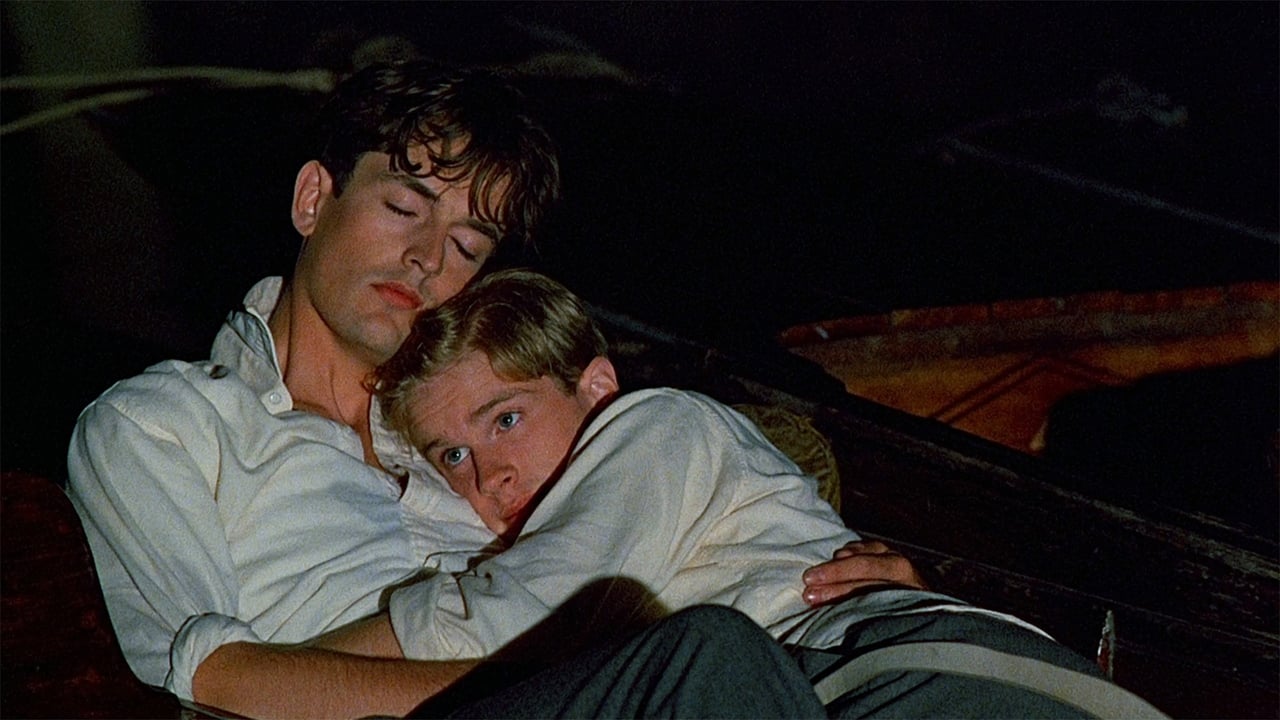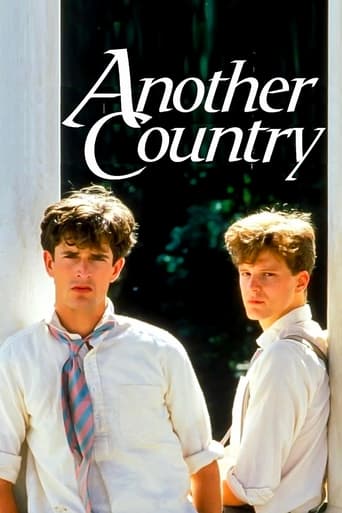Platicsco
Good story, Not enough for a whole film
Majorthebys
Charming and brutal
InformationRap
This is one of the few movies I've ever seen where the whole audience broke into spontaneous, loud applause a third of the way in.
Edwin
The storyline feels a little thin and moth-eaten in parts but this sequel is plenty of fun.
James Hitchcock
Although the closing titles contain the standard "all characters are fictitious" disclaimer, the scriptwriter Julian Mitchell has never denied that his main character Guy Bennett is a thinly-disguised portrait of Guy Burgess, one of the notorious Cambridge spy ring who acted for Soviet Russia. The film is mostly set in an English public school during the 1930s, based on Eton where Burgess was educated. (What shocked British society most about the spy ring was not so much the treachery of its members as the fact that most of them were from well-off Establishment families and educated at the country's most prestigious schools).At the heart of the film is the friendship between Bennett and another student, Tommy Judd. Although they are very different in personality, they are drawn to one another because both, in their own way, are rebels against the system. Judd, a committed Marxist, is a rebel with a cause who despises the school and all it stands for. Bennett is a rebel without a cause whose attitudes are rather contradictory. He can see the absurdity and hypocrisy of the public school system and of the Establishment in general, but still wants to benefit from that system. His greatest ambition is to become a "god", school slang for a senior prefect, regarded as the school's social elite. Much of the plot revolves around the machinations of various senior pupils to achieve this coveted distinction; Judd is virtually alone in disdaining it. At this stage Bennett is not actually a Communist; when Judd quotes Lenin's attack on Karl Kautsky, spouting a lot of Marxist jargon in the process, Bennett replies "Oh, that's bad!", but in a sarcastic tone of voice which implies that he neither knows nor cares what Judd is talking about.Bennett is also trying to come to terms with his homosexuality. He is engaged in a sexual relationship with another boy, James Harcourt, and there are indications that he has engaged in similar behaviour with others. The school's attitude to homosexuality, in fact, is fairly schizophrenic. Bennett and Harcourt are by no means the only pupils involved in gay relationships; indeed, another boy in Bennett's house has recently committed suicide after being caught in flagrante with his lover by a teacher. The greatest concern, however, of the staff and most of the prefects is the need to avoid scandal; gay relationships are quietly tolerated provided they are kept discreet. When one prefect, Fowler, attempts to crack down on homosexuality, motivated by Puritanical religious zeal, he makes himself very unpopular with his fellows, who fear that he might uncover things best left hidden. Bennett represents a challenge to this system of organised hypocrisy, not because he is gay but because he is temperamentally incapable of discretion. The greatest sin is to get caught, because that would force the authorities to take action they would prefer to avoid.If scandal does leak out, the authorities prefer to insist that the boys were merely experimenting or going through a youthful phase. Even the otherwise nonconformist Judd takes this line. (Unlike some of his colleagues, he is firmly heterosexual and regards homosexuality with bemused incomprehension). Bennett, however, realises that being gay is an inescapable part of who he is, not a mere passing fad, and that he will never love women. The film's implication, in fact, is that Bennett/Burgess spied for the Russians not because he was a convinced Communist but as an act of revenge against the British Establishment for rejecting him on account of his sexual orientation. He never asked himself whether his sexuality would be any more acceptable to the Soviet Establishment than it was to the British one. (By the time the film was made in 1984, homosexuality had been legalised in Britain but remained strictly banned in Russia).On one level the title "Another Country" is derived from a line in the hymn "I Vow to Thee, My Country", which we hear being sung, although on another it refers to the Soviet Union, the state to which Judd and ultimately Bennett give their loyalty, with perhaps a hidden reference to Orwell's theory of "transferred nationalism"- the idea that supporters of Stalin and Soviet Russia were motivated by the same type of uncritical, unthinking nationalism as flag-waving British jingoists, with the difference that their loyalty was transferred from their own country to a foreign one."Another Country" was made by Goldcrest, the company which has become most closely associated with the great British cinematic revival of the eighties, but unlike some of their other productions it has largely disappeared from view over the last thirty years. In 1984, controversy over the spy ring was still raging. Leftists, who might under other circumstances have been sympathetic to Communism, savagely attacked the spies as prize examples of upper-class treachery and corruption, whereas some rightists, most notoriously Peregrine Worsthorne, attempted to defend them on the grounds that loyalty to one's beliefs could be more important than loyalty to one's country.Since the end of the Cold Way we no longer care as much about the Cambridge Spies as we once did, which may explain why "Another Country" can seem unfashionable these days. It is, however, a very good film, distinguished by an excellent performance from a young Colin Firth as Judd, surprisingly likable despite his extremist views, and an even better one from Rupert Everett as the floppy-haired, nonchalantly rebellious yet secretly vulnerable Bennett. It also has a lot to say about matters of perennial importance- loyalty to country, loyalty to friends, political idealism and the rights of sexual minorities. An intriguing and thought-provoking film. 8/10
MieMar
This film is ageing brilliantly well. OK, the end might, the chat about accepting your sexuality etc, be very much of its time and of the stage where the film originated, but the film is crisp and, despite its slowness, wonderfully alive. The classically beautiful photography also helps the timeless feel of it. In the scenes of Everett and Firth the film really comes alive, and the actors have hardly since been better. Firth of course has less to do but the strange Firth hallmark reserve - which Tom Ford exploited for A Single Man but for me, in most roles including that one, makes him somehow permanently fake - has not yet set in. Judd, the character, holds himself back but is present in a way that older Firth rarely manages. Everett, without a doubt, has never been better. Which, in itself, is a bit of a tragedy. Its a fantastic role but he is stunningly good, subtle and showy at the same time. No wonder that Orson Welles was impressed. His Guy is insolent, vulnerable, naive, world-wise, cynical, poetic, open, deceptive, gentle and ruthless. I was a bit of an admirer of Everett's work and persona even before seeing this film - he seems one of the last real people out there, in the homogenised, we're all just lovely people, really, fame-game arena - but find to my disappointment that his acting work is too often the least interesting thing about him. Which, truly, is a pity because as this film shows, he really has the goods as an actor - and clearly enough experience and emotional honesty in real life too - to actually really grab us, draw us in and make us feel for him, with him. But in a lot of his work it seems he rarely brings the full package of emotions to work, happy to perform a facet of a man for us - often a rather glib one - rather than a full creature. I'd love to see him do something brave again, as I am sure that the man and the actor he is now could wash the floor with his younger self, in terms of complex, deeply felt emotion.Another Country, with is milieu of extreme constraint, beautifully frames the feeling and behaviour of the boys it observes, and the focus on the endless rituals of the boarding school life also work to remind us how world is out to shape these boys (a kind of an anti-Harry Potter/Trinian's, in that aspect) and works still as a metaphor for society at large. In some ways times have changed less than we'd hope - or less than it looked like it would change, a few decades ago - even if caning is a distant memory. I wanted to give Another Country 9 stars but unfortunately, although the cast in uniformly very strong I feel that the third key role, Guy's love interest James, hasn't dated well and the performance is flat, leaving Everett to do all the work in their scenes. For the film to overcome the slight staginess of the ending and to give real meaning to the innocent way that Guy and James choose to conduct their romance when boys around them are clearly habitually doing much more would have needed an actor who could match Firth and Everett in terms of interpretation of a role. Oh, and people who can be bothered to complain about the old-man make up on Everett at the end - get a life. This is a film, all latex looks fake, even today, how ever much you choose to believe it, for what ever reason.
T Y
You'd think a movie making a point about treason would allow some room for depth and ideas. But this movie is a shallow, wealth and privilege-envy piece. Pretty boys traipse through this would-be drama that adopts the viewpoint of a petulant, oblivious, vain, homosexual snob away at school in Jolly Old. The twee goings-on advance the preposterous premise that Guy Bennett (based on Guy Burgess) went Commie because he was gay, and was thrown out of school before he got to wear his foppish upper-classmen vest. Oh brother! ...oh, and he received a caning once. He was OK with the canings others received as a routine part of the English school system, but HIS caning hurt. This is roughly analogous to saying Guy Bennett became a roadside bandit, a pirate, or an evil scientist because he had a bad experience at Cambridge. Yeah, everyone has a bad experience at Cambridge. As depicted here, Bennett becoming a Communist in response to his social structure is as likely as Martha Stewart becoming a Sumo wrestler after she burnt a soufflé. Bennett is interested in nothing but himself, as played by Rupert Everett. "How dare you think about the script? Just look at those high production values!"
kdrobison
This could have been a great film, but was only an okay film. I could make many comments, but I just have a question. The final scene (one of only two times we have to see Rupert embroiled in that awful makeup that renders him unable to move a single muscle in his face) ends abruptly and goes to credits. Ordinarily I would chalk this up to a lame ending, which it may very well be. But the rented DVD I have lists the movie at 107 minutes. The actual playing time is 84 minutes. Could be a typo, I guess, but it's way off. Plus, movies that are 90 minutes or less are often of the slasher variety, not the drama variety. If you have any thoughts or if I'm just out of my mind, e-mail me privately as I probably won't check this often.

